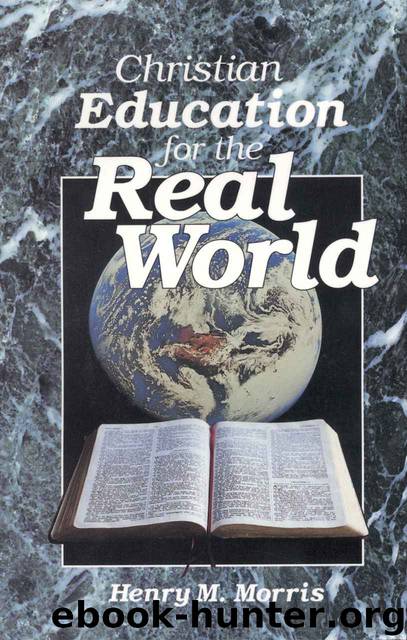Christian Education for the Real World by Henry M. Morris

Author:Henry M. Morris [Morris, Henry M.]
Language: eng
Format: epub
ISBN: 9781614583301
Publisher: Master Books
Published: 1991-10-01T00:00:00+00:00
2. For a more detailed discussion and analysis of this remarkable “triuneness” of the physical creation, see the author’s book The Biblical Basis for Modern Science (Green Forest, AR: Master Books, 1984), p. 46–55.
3. Henry M. Morris, The Biblical Basis for Modern Science (Green Forest, AR: Master Books, 1984).
Chapter 5
The Teaching and the Teacher
The purpose of this book does not include discussion of the problems associated with the founding, financing, and day-to-day operation of a Christian school or college. These are important matters, but are beyond the scope of this book. We are occupied here more with the basic Biblical doctrine of education, its nature and importance. Of special concern is the subject material included in the curriculum and the overall biblical perspective of the school. In the next two chapters we wish to look in more detail at the curricular structure and the principles for its development, the necessary qualifications of the teachers who must implement it, and the most effective methods for implementing it. Not even in these areas, however, are we attempting to produce a “how-to-do-it” manual, with detailed curricula and course syllabi but simply to formulate broad principles, based on Scripture, which can serve as a framework within which the complete structure can be developed in accordance with the local needs and goals of individual institutions.
To some extent, these later chapters will review and codify the material introduced in previous chapters, while simultaneously amplifying important principles and methods for their best implementation in this great ministry of true education.
Principles of Curriculum Construction
One of the great dangers in a Christian school is the temptation to conform its courses to those of the secular school. Many denominational colleges, for example, are today so secularized that it is hard to tell the difference between a private religious school and a private non-religious school. In fact, many great universities today (Harvard, Dartmouth, Yale, and others) were founded by Christians to provide Christian education, but have long since lost their Christian orientation, and are now completely humanistic. Others (Notre Dame, Baylor, Southern Methodist, etc.) still have a nominal religious and denominational flavor, but have become altogether dominated by evolutionism and religious liberalism.
Even evangelical schools (especially those in the “neo-evangelical” movement) have compromised with evolutionary, humanistic, and liberal philosophies to an entirely unwarranted degree, from the perspective of the biblical doctrine of education. On the other hand, many Bible colleges and similar institutions have tended to concentrate almost exclusively on evangelism, Bible exegesis, and the spiritual life, largely ignoring the wide range of subject areas embraced within God’s original mandate of terrestrial stewardship.
It is not sufficient, insofar as the biblical doctrine of education is concerned, merely to provide a Christian environment (e.g., chapel services, behavior rules, annual spiritual emphasis week, etc.) for what amounts to a secular curriculum. Neither is it adequate to add a specified number of courses in Bible and religion to an otherwise secular curriculum. It is not even enough to require students and faculty to agree to a
Download
This site does not store any files on its server. We only index and link to content provided by other sites. Please contact the content providers to delete copyright contents if any and email us, we'll remove relevant links or contents immediately.
Habits of Grace by David Mathis(1975)
Anxious for Nothing by Max Lucado(1968)
A Prophet with Honor by William C. Martin(1717)
Peace with God by Billy Graham(1680)
Long Bright River by Liz Moore(1582)
Expectation by Anna Hope(1458)
Whisper by Mark Batterson(1452)
The Natural Sciences: A Student's Guide by John A. Bloom(1396)
The Wondrous Workings of Planet Earth by Rachel Ignotofsky(1335)
Fortitude by Dan Crenshaw(1198)
Taste and See by Margaret Feinberg(1124)
Your Story Matters by Leslie Leyland Fields(1104)
Answers Book for Kids, Volume 3 by Ken Ham & Cindy Malott(1094)
I Declare War by Levi Lusko(1088)
ST01 by Unknown Author(1068)
Everybody, Always by Bob Goff(1068)
If by Mark Batterson(1062)
The Case for Miracles by Lee Strobel(1038)
Power for Living by T. D. Jakes(1028)
